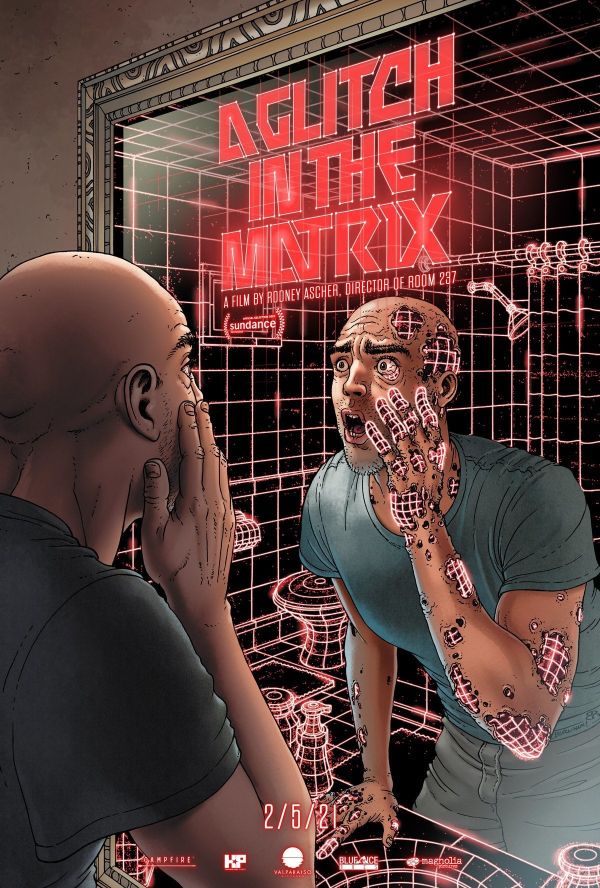Doc Corner, by Glenn Dunks, is back after its brief hiatus.
 Rodney Ascher makes extremely goofy documentaries. I am sure that he comes at them with all the seriousness that their dark and sinister tones would suggest, but that doesn’t stop them from ending up as, well, extremely goofy movies. There was Room 237 about interpretations of Stanley Kubrick’s The Shining. There was also The Nightmare, about sleep paralysis. Both goofy.
Rodney Ascher makes extremely goofy documentaries. I am sure that he comes at them with all the seriousness that their dark and sinister tones would suggest, but that doesn’t stop them from ending up as, well, extremely goofy movies. There was Room 237 about interpretations of Stanley Kubrick’s The Shining. There was also The Nightmare, about sleep paralysis. Both goofy.
That doesn’t mean they’re not entertaining. In fact, that’s often their most commendable aspect. Lord knows, it certainly cannot be said that Ascher lacks imagination behind the camera and has an ability to gravitate towards subjects that demand more than a basic documentary toolkit to pull together...
But sometimes—okay, quite regularly—one can’t shake the feeling that he is done in by his own interest in paranoia. They can be closer to YouTube fan-theory videos than serious explorations. Case in point, his latest. The philosophical wank of A Glitch in the Matrix.
Ascher picks up the baton where The Matrix theoretically left off (maybe you remember The Matrix Revolutions better than I do) and traverses the unprovable thesis that we all live in a simulation. That there is some player making us—or allowing us?—to do what we are doing, and even that there are game-only characters like the fresh produce man at the supermarket who aren’t real, but just code to improve the credibility of this invented reality. It’s Philip K. Dick by way of The Sims.
Old video of Dick is prevalent throughout, his theories about simulation are well known and obvious. There’s also Elon Musk. The less said the better. There’s writers and more (we're led to assume) mundane talking heads appear as avatars, shiny gem-like helmet-wearing computer game characters that enthusiastically detailed theories that are clearly absurd and yet which they appear to believe whole-heartedly. Solipsism by way of Hollywood, I suppose? “The Matrix was real!” Like I said, it’s all very silly. Especially if you already think it’s silly from the get-go, which it most assuredly is.
What I don’t think Ascher truly understands about what made The Matrix so intriguing and so open to interpretation (even while it, too, is performing high-wire silly action movie stunts) is that its world felt so thoroughly realized. Obviously documentaries like Glitch don’t have the luxury of mega-budget bells and whistles, but stripped away from the explosions and the chases, the leather and the Keanu, it’s all entirely preposterous.

Truly. Of course, maybe Ascher’s film ultimately wins because here I am wanting to get into René Descartes, whose work (somewhat paraphrased) contends that because our mind can hypothesise simulation, this all but proves it cannot be. Would whomever or whatever technology created our simulated existence not also be smart enough to add a digital 0 here or a digital 1 there (or whatever advanced system they utilise) to ensure the very concept never came to out feeble minds? Essentially, I very much believe humans would allow Skynet to grow self-aware, but I wouldn’t bet on Skynet making the same mistake with us if it were the other way around. If you know what I mean.
Like I said, it’s all very silly. Well, until it’s not.
The film avoids the more unsanitary elements of The Matrix’s legacy as a men’s rights legacy pick and the cult of the alpha male. Likewise, the film’s themes around transgender individuals. This might appear wise given the very loosey goosey attitudes the film’s first hour takes with tone. But at some point, A Glitch turns dark, and actually for the better, as it examines a real life case where the core concepts of The Matrix were used in defence of a horrible crime. Like somebody took the twinkie defence and mashed it with the “violent video games made him do it” argument about teenage violence.
![]()
Here the film actually pivots to something that isn’t goofy or silly (although it is still an excuse for computer animated set-pieces) and feels as if it genuinely has something to say. This is both good and bad because I don’t think Ascher really has the filmmaking maturity to handle it, but it’s something of a welcome reprieve from the sort of “fruit loop paranoia” (thank you Wendy Ide of The Guardian) that populates the rest of the film.
My favourite Ascher film is actually one of his earliest. A 2010 short documentary oddity, The S from Hell, which is silly but also short and (seemingly) in on the joke that it is about something entirely ridiculous. I don’t think the director has been able to reach that film’s level of smartly off-center kookiness. Maybe A Glitch in the Matrix would have been better as a short, where its inherent silliness wouldn’t be quite so open for all to see, but rather remain a tantalising idea experiment thrown out into the pop universe. As it is, A Glitch in the Matrix is often too ludicrous to take seriously, and then too serious to be played for laughs. Like the very theory at its core, Rodney Ascher’s film is too unproven in its ideas to be convincing.
Release: Currently available to rent through Prime, Vudu and the likes. It may still be in some sort of theatrical release.
Oscar chances: Due to the Oscar's eligibility window, this was on last year's epic long-list and—as we all know—did not progress. I wouldn't have expected it anyway.